A Book Review by Jay Lemming
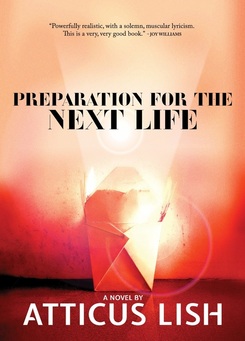
The New York City of Atticus Lish’s Preparation for the Next Life is an environment of broken things, of abandoned objects and people that once had presence and purpose but from which all meaning has since fled. Lish’s world is a landscape of sordid alleys, distant night-time shouts, burnt-out car skeletons, weed-choked lots of broken pavement, chain-linked fences sprinkled with glass, blue-lit bars, underpasses, trestles, electricity towers, industrial fields, expressways, cracked cement stanchions with exposed rebar, gutted buildings, warehouses, profane, talented graffiti, and late-night, slow-moving cop cars with lights on but sirens off, prowling for anything they care to ensnare at a given moment.
Preparation for the Next Life is the fictional account of 23-year-old Iraqi War Veteran Brad Skinner and his illegal-immigrant girlfriend wandering through a post-9/11 circle of Hell as devastating as anything Virgil ever passed through in Dante’s Inferno. Just returned from his third tour of duty, Skinner, in possession of a little money, a lot of painkillers, a shrapnel-scarred back, an army-issue 9-mm handgun and unstoppable memories (and images on his laptop) of blown-up bodies, meets Zhou Lei. Zhou is a Uighur Muslim from China whose father was killed in the national army, removing any sense of security she and her loving mother once had. Having since fled home and crossed illegally from Mexico into the United States, she is briefly detained then released again. When she meets Skinner, she is struggling to leverage food court restaurant jobs and DVD sales gigs into something approaching a livelihood.
Both worn-down lives converge into a series of dates at Kentucky Fried Chicken, McDonalds and Chinese food restaurants, and then into something like romance for two individuals caught on life's downward slope. What dismays more than their troubles is the human presence so apparently alive inside them but which, like flowers set to grow in the dark, can never emerge. Zhou Lei’s incessant exercise regimen recalls not only her father’s military training but also a dedication to personal development that sadly will amount to little with not even enough dollars in her pocket to buy a decent pair of shoes.
And Skinner has personality enough to earn Zhou’s affection and the sympathy of other vets, two of whom accost him outside a bar where he has been drinking alone and who offer concerned words of support. Personality yes, but not sufficient capacity for companionship that might allow Skinner to join those vets. He is friendly and cordial with them, and then wanders off alone into the night.
Both worn-down lives converge into a series of dates at Kentucky Fried Chicken, McDonalds and Chinese food restaurants, and then into something like romance for two individuals caught on life's downward slope. What dismays more than their troubles is the human presence so apparently alive inside them but which, like flowers set to grow in the dark, can never emerge. Zhou Lei’s incessant exercise regimen recalls not only her father’s military training but also a dedication to personal development that sadly will amount to little with not even enough dollars in her pocket to buy a decent pair of shoes.
And Skinner has personality enough to earn Zhou’s affection and the sympathy of other vets, two of whom accost him outside a bar where he has been drinking alone and who offer concerned words of support. Personality yes, but not sufficient capacity for companionship that might allow Skinner to join those vets. He is friendly and cordial with them, and then wanders off alone into the night.
| Of course while Skinner doesn't stick with his war buddies, the Department of Defense can't stick with him either, writing to explain that they find no connection between his wartime experiences and his psychosis, and that they won’t be sending support. The result is the presumptive downward spiral. “His episodes of weeping had not started yet, but they would….He did not understand the process he was going through. He did not have a medical degree. It was not a healing process. The breaking down was the opposite of that. It was not catharsis. He didn’t know enough to be as scared as he should have been, or he might have gone to the VA.” Zhou Lei struggles to connect with her own Muslim community, which was fundamental to life in China. As war vets reach out to no avail to Skinner, Zhou Lei finds herself welcomed with food and kindness into a Muslim temple. An imam invites her to return to learn more about God but she does not return. | |

Skinner and Zhou exist in a realm beyond the names that others might call them, indeed beyond the names they might call themselves—war veteran and Uighur Muslim immigrant. Their trauma strips each of any role they might have in a socially-oriented sense and, in the end, that is what saves Preparation for the Next Life from reading as political declaration.
Author Lish, son of renowned writer and editor, Gordon Lish, and recently announced winner of the PEN / Faulkner Award for this debut novel, certainly offers plausible commentary into the reader’s hands about the incapacitated state of an Iraqi war veteran and the fear plaguing migrants whose Muslim background makes them particularly susceptible to the anger of scared and angry Americans. But neither individual has the interest nor the luxury to self-identify in any meaningful way.
Then Lish only subtly reminds readers of his novel's time period with the occasional offhand reference: “A mural had been painted on a roll-down gate, showing the pyramids and pharaohs of Egypt looking like mountainous thunderheads above the New York skyline, in which the Towers were still standing.” The mural replicates the novel’s development as one that blends cultures, religions, languages, traditions into the world of not just Skinner and Zhou, but of all the displaced, paralyzed and forgotten--regardless of their respective backgrounds. The universe of convicts, addicts, dealers, the tattooed, the otherwise marked, the grief-stricken and the simple big mouths is the only community Skinner and Zhou know, and there is room enough for all who drop this far down.
In the post-Towers world, New York's esteem has become neutered by what it has done overseas and by what it has become at home. It has become neutered in its treatment of its people and the treatment of others. New York’s—or is it America’s?—greatness has become history along with Egyptian pharaohs. So is this Lish’s statement? If nothing is truly political in Preparation for the Next Life, then everything is.
The novel concludes in classic New York fashion with a landlord-tenant disagreement. The working-class Irish family from whom Skinner has been renting a basement apartment in Queens welcomes home their hulking convict son from jail whose presence immediately fills the home. The tension between Jimmy Murphy, who has a history of drugs and violence, and Skinner, is immediate. With two men under severe pressures from their personal histories, it is only a matter of time before something explodes.
And the climax does explode. Sadly there won't be a better future for Skinner and Zhou, though Zhou has held on faithfully despite Skinner's ever-deepening descent into painkiller-induced stupors. He lives in a box he cannot escape. Despite an occasional workout at the gym, his final go-to resources are pills, emotion-laden memories and a firearm.
Preparation for the Next Life is a dystopian peregrination, the benighted underbelly of Whitman's Leaves of Grass, where walks through discarded and benighted city landscapes offer Skinner and Zhou never-ending reminders of their fallen lives. Friend and foe look the same, and both emerge from the dark. This novel cannot be called particularly enjoyable but it is definitely effective. The New York of Atticus Lish is nowhere anyone would want to be. But the emotions that run through its citizen's lives are eerily familiar.
Author Lish, son of renowned writer and editor, Gordon Lish, and recently announced winner of the PEN / Faulkner Award for this debut novel, certainly offers plausible commentary into the reader’s hands about the incapacitated state of an Iraqi war veteran and the fear plaguing migrants whose Muslim background makes them particularly susceptible to the anger of scared and angry Americans. But neither individual has the interest nor the luxury to self-identify in any meaningful way.
Then Lish only subtly reminds readers of his novel's time period with the occasional offhand reference: “A mural had been painted on a roll-down gate, showing the pyramids and pharaohs of Egypt looking like mountainous thunderheads above the New York skyline, in which the Towers were still standing.” The mural replicates the novel’s development as one that blends cultures, religions, languages, traditions into the world of not just Skinner and Zhou, but of all the displaced, paralyzed and forgotten--regardless of their respective backgrounds. The universe of convicts, addicts, dealers, the tattooed, the otherwise marked, the grief-stricken and the simple big mouths is the only community Skinner and Zhou know, and there is room enough for all who drop this far down.
In the post-Towers world, New York's esteem has become neutered by what it has done overseas and by what it has become at home. It has become neutered in its treatment of its people and the treatment of others. New York’s—or is it America’s?—greatness has become history along with Egyptian pharaohs. So is this Lish’s statement? If nothing is truly political in Preparation for the Next Life, then everything is.
The novel concludes in classic New York fashion with a landlord-tenant disagreement. The working-class Irish family from whom Skinner has been renting a basement apartment in Queens welcomes home their hulking convict son from jail whose presence immediately fills the home. The tension between Jimmy Murphy, who has a history of drugs and violence, and Skinner, is immediate. With two men under severe pressures from their personal histories, it is only a matter of time before something explodes.
And the climax does explode. Sadly there won't be a better future for Skinner and Zhou, though Zhou has held on faithfully despite Skinner's ever-deepening descent into painkiller-induced stupors. He lives in a box he cannot escape. Despite an occasional workout at the gym, his final go-to resources are pills, emotion-laden memories and a firearm.
Preparation for the Next Life is a dystopian peregrination, the benighted underbelly of Whitman's Leaves of Grass, where walks through discarded and benighted city landscapes offer Skinner and Zhou never-ending reminders of their fallen lives. Friend and foe look the same, and both emerge from the dark. This novel cannot be called particularly enjoyable but it is definitely effective. The New York of Atticus Lish is nowhere anyone would want to be. But the emotions that run through its citizen's lives are eerily familiar.
| Jay Lemming writes and lives in the Washington, DC metropolitan region. His work has appeared in the Miami Herald, the Pittsburgh Post-Gazette, LiteraryTravler.com, Eclectica and elsewhere. He just kicked off a literary blog called Unleash the Write Stuff and invites those interested in literary writing to join his online community. |
Read More Book Reviews on the ARDOR Blog:
You Might Also Like: 53 Poetry Contests that Pay (Really Well)
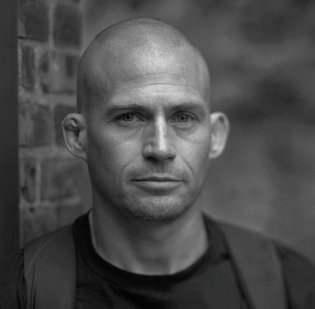

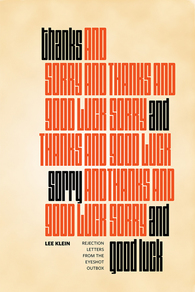
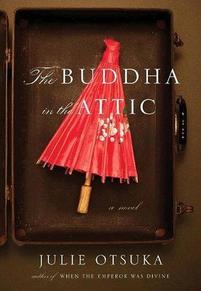
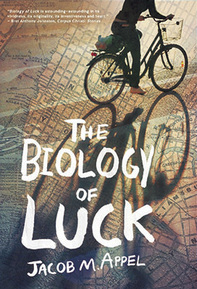
 RSS Feed
RSS Feed

